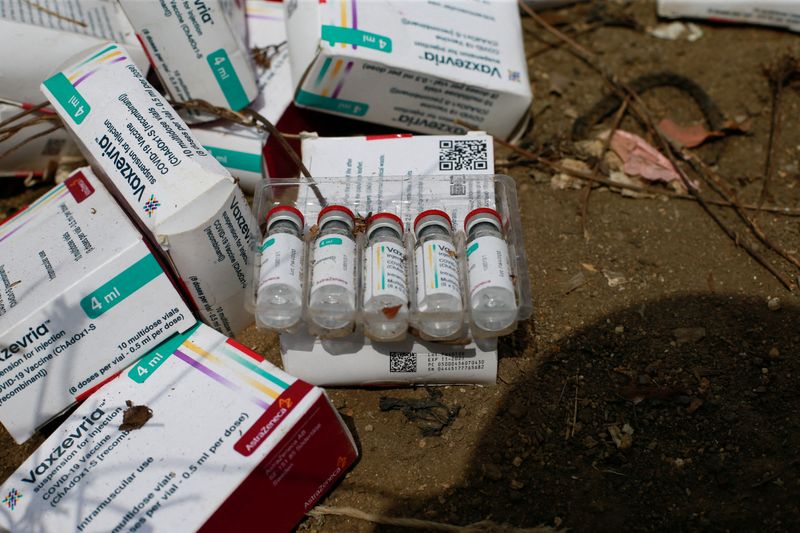By Francesco Guarascio
BRUSSELS (Reuters) -Poorer nations last month rejected more than 100 million doses of COVID-19 vaccines distributed by the global programme COVAX, mainly because of a rapidly approaching expiry date, a UNICEF official said on Thursday.
The big figure shows the difficulties of vaccinating the world's population, despite growing supplies of shots, with COVAX getting closer to delivering 1 billion doses to nearly 150 countries.
"More than a 100 million have been rejected just in December alone," Etleva Kadilli, director of the supply division at the U.N. agency, told lawmakers at the European Parliament, adding that the main reason for rejection was their short shelf life.
Later in the day a spokesperson for the U.N. children's agency said that of the 100 million doses rejected, 15.5 million were deemed to have been destroyed. Some doses were rejected by multiple countries.
UNICEF did not reply to a query on the total of rejected doses so far, in addition to those rejected in December.
Wealthy countries donating vaccines with a relatively short shelf life has been a "major problem" for COVAX, a senior official of the World Health Organization said last month.
Poorer nations have also been forced to delay supplies because they have insufficient storage facilities, Kadilli said, including a lack of fridges for vaccines - for which COVAX investments have been delayed for months.
Many countries also face high levels of vaccine hesitancy and have overburdened healthcare systems.
By the end of 2021 the EU had made available to poorer nations 380 million doses, of which only 255 million have been delivered, the European Commission has said.
Many other doses are stored for use in poorer nations.
UNICEF data shows 681 million shipped doses are now stored in about 90 poorer nations, says CARE, a charity, which extracted the figures from a public database.
More than 30 poorer nations, including big states such as the Democratic Republic of Congo and Nigeria, have used fewer than half of the doses they received, CARE said.
A spokesperson for Gavi, a vaccine alliance which co-manages COVAX, said the high storage level was because of a surge in deliveries in the last quarter, especially in December.
Gavi added that most vaccines recently shipped by COVAX had a long shelf life, and so were unlikely to be wasted.
MORE SHIPMENTS
COVAX, which is co-led by the WHO, has delivered 987 million COVID-19 vaccines to 144 countries, Gavi data shows.
COVAX is the main supplier to dozens of poorer nations, but not the only one, as some countries buy doses on their own or use other regional programmes.
Supplies to poorer nations have long been very limited because of lack of vaccines, as wealthier countries secured most of the doses initially available from December 2020.
But shipments have increased exponentially in the last quarter, thanks to donations from rich countries that have vaccinated the majority of their populations.
In January, 67% of the population in richer nations had been fully vaccinated, whereas only 8% in poorer nations have received their first dose, WHO figures show.
Increased supply caught many recipients unprepared.
"We have countries that are pushing doses that are currently available towards quarter two of 2022," Kadilli said.
Of the 15 million doses from the EU that have been refused, three-quarters were AstraZeneca (NASDAQ:AZN) shots with a shelf life of less than 10 weeks upon arrival, according to a UNICEF slide.
"You want to have adequate time to move vaccines from depots," said Kenya's health ministry spokesperson Mburugu Gikunda said, adding that doses near expiry would go to waste if accepted.
Reuters reported in December that up to one million vaccines were estimated to have expired in Nigeria the previous month without being used.
